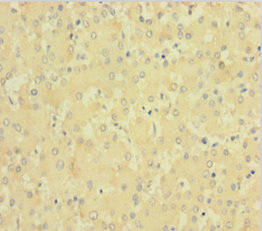F11 Antibody (PACO26597)
- SKU:
- PACO26597
- Product Type:
- Antibody
- Reactivity:
- Human
- Host Species:
- Rabbit
- Isotype:
- IgG
- Applications:
- ELISA
- IHC
- Antibody Type:
- Polyclonal Antibody
- Conjugation:
- Unconjugated
Description
F11 Antibody (PACO26597)
The F11 Antibody (PAC026597) is a highly specific polyclonal antibody designed for research involving the F11 protein, which is a cell surface molecule known for its role in immune regulation. This antibody, raised in rabbits, is particularly reactive with human samples and has been validated for use in various applications, including Western blot analysis. By binding to the F11 protein, this antibody enables the detection and analysis of F11 in different cell types, making it an excellent tool for immunology and cancer research studies.The F11 protein, also referred to as an immune inhibitory receptor, plays a crucial part in maintaining immune homeostasis by controlling inflammation and suppressing allergic reactions.
Its importance in modulating immune responses highlights its potential as a valuable target for research on diseases such as cancer, autoimmune disorders, and chronic inflammatory conditions. Understanding the function of the F11 protein is essential for the development of therapies that can either harness or regulate immune activity in these disease contexts. Overall, the F11 Antibody (PAC026597) offers researchers a reliable tool for investigating the role of the F11 protein in immune regulation and its potential implications for various diseases.
| Antibody Name: | F11 Antibody (PACO26597) |
| Antibody SKU: | PACO26597 |
| Size: | 50ug |
| Host Species: | Rabbit |
| Tested Applications: | ELISA, IHC |
| Recommended Dilutions: | ELISA:1:2000-1:10000, IHC:1:20-1:200 |
| Species Reactivity: | Human |
| Immunogen: | Recombinant Human Coagulation factor XI protein (19-387AA) |
| Form: | Liquid |
| Storage Buffer: | Preservative: 0.03% Proclin 300 Constituents: 50% Glycerol, 0.01M PBS, PH 7.4 |
| Purification Method: | >95%, Protein G purified |
| Clonality: | Polyclonal |
| Isotype: | IgG |
| Conjugate: | Non-conjugated |
 | Immunohistochemistry of paraffin-embedded human liver tissue using PACO26597 at dilution of 1:100. |
| Background: | Factor XI triggers the middle phase of the intrinsic pathway of blood coagulation by activating factor IX. |
| Synonyms: | Coagulation factor XI (FXI) (EC 3.4.21.27) (Plasma thromboplastin antecedent) (PTA) [Cleaved into: Coagulation factor XIa heavy chain; Coagulation factor XIa light chain], F11 |
| UniProt Protein Function: | F11: Factor XI triggers the middle phase of the intrinsic pathway of blood coagulation by activating factor IX. Defects in F11 are the cause of factor XI deficiency (FA11D); also known as plasma thromboplastin antecedent deficiency or Rosenthal syndrome. It is a hemorrhagic disease characterized by reduced levels and activity of factor XI resulting in moderate bleeding symptoms, usually occurring after trauma or surgery. Patients usually do not present spontaneous bleeding but women can present with menorrhagia. Hemorrhages are usually moderate. Belongs to the peptidase S1 family. Plasma kallikrein subfamily. 2 isoforms of the human protein are produced by alternative splicing. |
| UniProt Protein Details: | Protein type:Protease; Secreted, signal peptide; EC 3.4.21.27; Secreted Chromosomal Location of Human Ortholog: 4q35 Cellular Component: extracellular region; extracellular space; plasma membrane Molecular Function:protein binding Biological Process: blood coagulation, intrinsic pathway; plasminogen activation; positive regulation of fibrinolysis Disease: Factor Xi Deficiency |
| NCBI Summary: | This gene encodes coagulation factor XI of the blood coagulation cascade. This protein is present in plasma as a zymogen, which is a unique plasma coagulation enzyme because it exists as a homodimer consisting of two identical polypeptide chains linked by disulfide bonds. During activation of the plasma factor XI, an internal peptide bond is cleaved by factor XIIa (or XII) in each of the two chains, resulting in activated factor XIa, a serine protease composed of two heavy and two light chains held together by disulfide bonds. This activated plasma factor XI triggers the middle phase of the intrisic pathway of blood coagulation by activating factor IX. Defects in this factor lead to Rosenthal syndrome, a blood coagulation abnormality. [provided by RefSeq, Jul 2008] |
| UniProt Code: | P03951 |
| NCBI GenInfo Identifier: | 119762 |
| NCBI Gene ID: | 2160 |
| NCBI Accession: | P03951.1 |
| UniProt Secondary Accession: | P03951,Q4W5C2, Q9Y495, D3DP64, |
| UniProt Related Accession: | P03951 |
| Molecular Weight: | 63,840 Da |
| NCBI Full Name: | Coagulation factor XI |
| NCBI Synonym Full Names: | coagulation factor XI |
| NCBI Official Symbol: | F11 |
| NCBI Official Synonym Symbols: | FXI |
| NCBI Protein Information: | coagulation factor XI |
| UniProt Protein Name: | Coagulation factor XI |
| UniProt Synonym Protein Names: | Plasma thromboplastin antecedent; PTA |
| Protein Family: | Coagulation factor |
| UniProt Gene Name: | F11 |
| UniProt Entry Name: | FA11_HUMAN |
| ELISA Kits |
| Human Factor XI / F11 ELISA Kit |
| Human F11 (Coagulation Factor XI) CLIA Kit (HUES00480) |
| Human F11 (Coagulation Factor XI) ELISA Kit (HUES01907) |
| Human Coagulation factor XI (F11) ELISA Kit |
| Secondary Antibody |
| Anti-HRP Goat Anti-Rabbit IgG (H+L) Antibody (CABS014) |
| Recommended Products |
| Anti-FITC Goat Anti-Rabbit IgG (H+L) Antibody (CABS011) |
| Anti-HRP-conjugated Beta Actin Antibody (CABC028) |


![FITC Anti-Mouse CD45 Antibody [30-F11] (AGEL2266) FITC Anti-Mouse CD45 Antibody [30-F11] (AGEL2266)](https://cdn11.bigcommerce.com/s-h68l9z2lnx/images/stencil/590x590/products/229713/605094/fitc-anti-mouse-cd45-antibody-30-f11__16887.1706889300.jpg?c=2)
![FITC Anti-Mouse CD45 Antibody [30-F11] (AGEL1657) FITC Anti-Mouse CD45 Antibody [30-F11] (AGEL1657)](https://cdn11.bigcommerce.com/s-h68l9z2lnx/images/stencil/590x590/products/22188/607049/fitc-anti-mouse-cd45-antibody-30-f11-agel1657__89308.1707499976.jpg?c=2)
![PE Anti-Mouse CD45 Antibody [30-F11] (AGEL2267) PE Anti-Mouse CD45 Antibody [30-F11] (AGEL2267)](https://cdn11.bigcommerce.com/s-h68l9z2lnx/images/stencil/590x590/products/229714/604954/pe-anti-mouse-cd45-antibody-30-f11-agel2267__51410.1706888838.jpg?c=2)
![APC Anti-Mouse CD45 Antibody [30-F11] (AGEL1659) APC Anti-Mouse CD45 Antibody [30-F11] (AGEL1659)](https://cdn11.bigcommerce.com/s-h68l9z2lnx/images/stencil/590x590/products/22190/607056/apc-anti-mouse-cd45-antibody-30-f11-agel1659__19839.1707499984.jpg?c=2)
![PE Anti-Mouse CD45 Antibody [30-F11] (AGEL1658) PE Anti-Mouse CD45 Antibody [30-F11] (AGEL1658)](https://cdn11.bigcommerce.com/s-h68l9z2lnx/images/stencil/590x590/products/22189/606835/pe-anti-mouse-cd45-antibody-30-f11-agel1658__68684.1707499278.jpg?c=2)
![PerCP Anti-Mouse CD45 Antibody [30-F11] (AGEL1670) PerCP Anti-Mouse CD45 Antibody [30-F11] (AGEL1670)](https://cdn11.bigcommerce.com/s-h68l9z2lnx/images/stencil/590x590/products/22201/605838/percp-anti-mouse-cd45-antibody-30-f11-agel1670__83921.1707496140.jpg?c=2)
![PE/Cyanine5.5 Anti-Mouse CD45 Antibody [30-F11] (AGEL1663) PE/Cyanine5.5 Anti-Mouse CD45 Antibody [30-F11] (AGEL1663)](https://cdn11.bigcommerce.com/s-h68l9z2lnx/images/stencil/590x590/products/22194/606379/pecyanine5.5-anti-mouse-cd45-antibody-30-f11-agel1663__44666.1707497821.jpg?c=2)